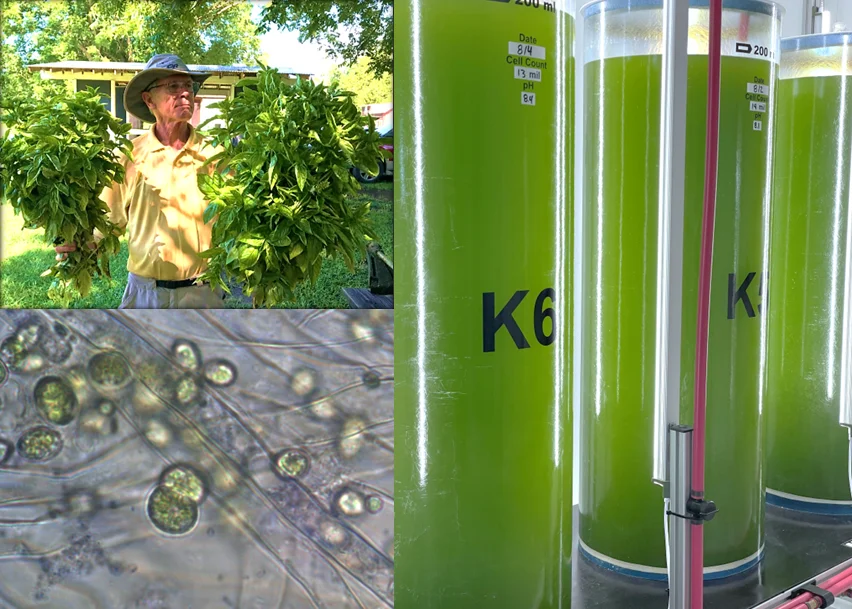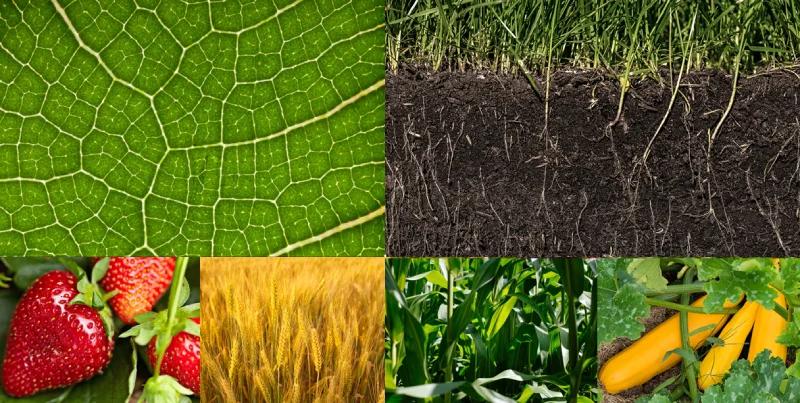Knowledgebase
The Science Behind EnSoil Algae™

Chlorella vulgaris: a Living Green Algae that Happens to be a Powerful Bio-stimulant
Micro-application of live Chlorella vulgaris has been studied as a Plant Bio-Stimulant (PBS) for the last 50 years. These are the claims we make for EnSoil Algae™ (ESA), a culture of Chlorella vulgaris, based on a large body of research.
Although EnSoil Algae™ may be used as a replacement for NPK fertilizers, it is a bio-stimulant, not a fertilizer. As defined by the US Farm Bill of 2018, it is “a substance or micro-organism that when applied to seeds, plants, or the rhizosphere, stimulates natural processes to enhance or benefit nutrient uptake, nutrient efficiency, tolerance to abiotic stress (drought or salinity), crop quality and yield.”
Published international research and our experience confirm that the bio-stimulant, live Chlorella vulgaris—EnSoil Algae™—promotes plant growth and health and volumes of soil testing has shown a positive effect on fertility.
Soil Health and Fertility, Naturally
As PBS, EnSoil Algae™ is a naturally occurring microorganism that is used for the purpose of stimulating natural processes in plants or in the soil in order to improve nutrient and/or water use efficiency by plants, help plants tolerate abiotic stress, or improve characteristics of the soil as a medium for plant growth. And when applied to seeds, plants, the rhizosphere, soil or other growth media, a PBS acts to support a plant’s natural nutrition processes independent of the biostimulant’s nutrient content, so it may be used either by itself or in combination with other substances or microbes for this purpose.

How to Measure Efficacy
Visual Plant Observations:
Visual Soil Observations:
Haney Soil Test
PFLA Test
Rhize Bio
Biome Makers
Plant Tissue Analysis
BRIX Analysis
Spectrometers
Plant and Soil Biology Terms
Bio-stimulant: any biological substance or microorganism applied on plants to stimulate natural processes including improving nutrition efficiency and density of the plant, stress tolerance and adaptation, soil water holding capacity, and soil health including microbe activity. EnSoil Algae™ is a powerful bio-stimulant
Soil microbe: a bacteria, archaebacteria, fungi, virus, or protozoa living in soil. A gram of soil can contain millions of microbes
Rhizophagy: a cycle occurring in the rhizosphere (the ecosystem of the soil) where microbes move between endophytic states (meaning inside the plant or algae cells) and free-moving in the soil. This includes an oxidation (oxygen-related chemical interaction) phase where nutrients, brought in by the microbes, are extracted from the microbes and benefit the plant
Synthetic NPK Input: a chemically produced fertilizer aimed to add Nitrogen (N), Phosphorus (P), and Potassium (K) to the plant, containing no biologicals
Nitrogen Fixation: the process where soil microbes take in Nitrogen gas (N2) from the atmosphere to chemically bond to other elements, forming compounds (nitrates, nitrites, and ammonia) used by plants for growth and health
The three main Soil Nutrients are Nitrogen, Phosphorus, and Potassium. Nitrogen promotes plant growth and is found in chlorophyll. Phosphorus helps the plant use energy from the sun and promotes root growth. Potassium helps the plant be resistant to diseases. There are other soil nutrient including Calcium, Magnesium and others found in small amounts
Brix analysis: a test measuring BRIX (sugars, vitamins, minerals, proteins) inside a plant’s sap. This is done by measuring light reflection